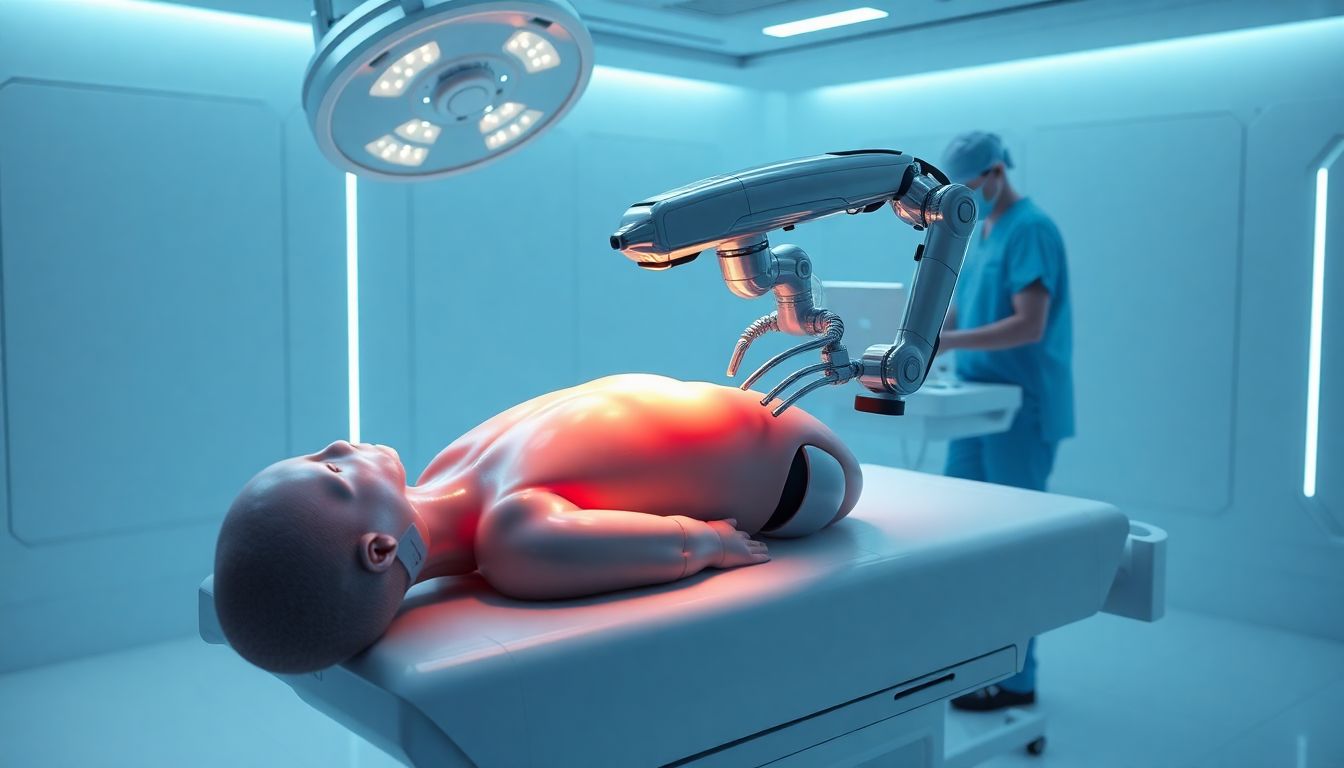Picture walking into an operating room. Robots have a gracefulness in their movement. Everything is driven by artificial intelligence. This isn’t science fiction. It’s the modern-day reality of surgery. Healthcare is evolving from Artificial Intelligence, robotic surgery. AI makes computers think like people. Robotic surgery uses robots to assist surgeons.
Read on to discover the exciting possibilities of AI and robotics in surgery. We stand back and think about, not only the good precision, the good outcomes, but some of the work that is yet to be done. Okay, prepare to find out how these technologies are changing medicine.
The Evolution of Robotic Surgery
The first robotic surgical system was introduced in the late 1980s, and has since evolved through several generations and applications.
Robotic surgery is not new. But adding AI is. This makes it even better. Let us take a look at how it all began.
ORIGINS OF ROBOTIC SYSTEMS
The Da Vinci Surgical System was a revolutionary advance. It was released in the early 2000s. As a result, surgeons could make smaller incisions. They also had better control. Surgeons got better fine motor skills with the Da Vinci system. They could also view in 3D, things that made many surgeries much better.
Other even earlier robotic platforms also contributed. They demonstrated advantages of robotic use. There were also benefits to patients, including less pain and quicker healing.
AI Enabling: An Entirely New Paradigm
Now artificial intelligence is working its way into robotic systems. This is changing everything. AIs are those with machine learning. Robots are capable of learning from previous operations. Computer vision improves the “vision” of robots. Surgical data analytics provides meaningful insights to surgeons. AI offers the ability to process large amounts of data quickly. This can help during surgery. It is truly a paradigm shift.
Advantages of Artificial Intelligence in Robotic Surgery
Robotics And AI Are Making Surgery Better. It offers a number of significant benefits. Let’s check them out.
Improved Accuracy and Precision
Examples include AI algorithms, that overall boost surgical accuracy. They can guide robots with incredible precision. This reduces human error. That gives surgeons more confidence when they work on delicate procedures. AI ensures that everything is as accurate as can be. This helps improve outcomes.
Improved Surgical Outcomes
AI and robotic surgery are helping speed recovery. Complications are often fewer for patients. Smaller cuts mean less pain. AI aids surgeons in making optimal decisions. This is resulting in better outcomes for patients. It literally is a win-win-win for everyone.
Data Processing in Real Time and Support for Making Decisions
AI provides surgeons data in the surgery. The future of decision making is powered by AI. It can examine scans and offer professional opinion. This could guide surgeons toward better decisions. It’s like having a guide there every step of the way. That can result in better outcomes.
Use of AI and Robotics in Various Surgical Specialties
Robotics and AI are utilized across many varieties of surgery. Let’s explore a few specific instances.
Cardiac Surgery: Artificial Intelligence and Robotics
AI is utilized across various industries, from construction to healthcare. It also can assist for bypass surgery. Less invasive procedures lead AI-assisted cardiac surgery. Patients recover faster. Robotic surgical approach results in reduced trauma. Smaller incisions are a plus.
AI and Robotics in Neurosurgery
Neurosurgery is pretty delicate. AI enables surgeons to excise tumors with pinpoint accuracy. It can also assist with spinal procedures. AI reduces damage to other tissues. This matters in the brain and spine. There’s great potential for improved results.
Artificial Intelligence and Robotics in Orthopaedic Surgery
Artificial intelligence guides joint replacement surgery. It is also useful for reconstruction. AI optimizes the placement of implants. Alignment is more precise. And this results in improved function. Which means less pain for patients in the long run. Artificial intelligence and robotics are changing orthopedic surgery.
Challenges and Limitations
Artificial intelligence and robotic surgery are short on challenges. These challenges also have to be solved. This will help ubiquitous these technologies.
Technical and Ethical Aspects
It is a complicated process when AI makes the decision. Particularly in moments of crisis. For one, data privacy is crucial. Patient data has to be kept safe. AI poses different ethical challenges that we must reconcile. We need to make sure that these technologies are used responsibly.
Cost and Accessibility
AI and robotic surgery are costly. That doesn’t make it accessible for everyone. We find ways to reduce the cost of their technologies. We want such advances to benefit everyone. Accessibility is a key issue.
Training and Regulatory Requirements
As a cardiac surgeon with experience of robotic surgery I know that we need some rules for AI and robotic surgery. Surgeons also need to be well trained. So standardised regulations and guidelines are necessary. This ensures safety. It also makes sure the technologies are applied properly.
The Future of AI and Robotic Surgery
The sky is the limit for AI and robotic surgery. Many advancements are coming. Let’s take a peek.
The New Age Powered by AI and Robotics Technology
Fully autonomous surgical robots might soon follow. These robots would be capable of performing surgeries independently. The haptic feedback is also coming along. It will give surgeons the ability to “feel” what the robot is doing. Robots will become even more aware through sensory integration.
Predictive Analytics and Personalized Surgery
AI can personalize surgery for every patient. It is able to predict surgical outcomes. This will enable personalized surgery. Predictive analytics can be part of the solution to problems. We can personalize surgery to fit the unique needs of each individual.
Conclusion
AI and robotics are revolutionizing surgery. They offer better precision. They improve outcomes. But, there are challenges. That is worth exploring, but we have to deal with ethical issues. We also need to lower costs. AI and robotics have huge potential. We need more research and more collaboration. Ethical concerns should still take priority. Welcome to the future of surgery.

